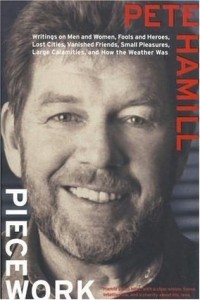The opening of “Cities of New York,” from Pete Hamill’s excellent collection, Piecework, in which the writer recalls NYC’s mid-twentieth century decline, which didn’t reverse until new media technology businesses began to take root in the city in the 1990s:
“If I’d grown up in another city, I almost certainly would have become another kind of writer. Or I might not have become a writer at all. But I grew up in New York in the 1940s, when New York was a great big optimistic town. The war was over and the Great Depression was a permanent part of the past; now we would all begin to live. To a kid (and to millions of adults) everything seemed possible. If you wanted to be a scientist or a left-fielder for the Dodgers, a lawyer or a drummer with Count Basie: well, why not? This was New York. You could even be an artist. Or a writer.
As a man and a writer, I’ve been cursed by the memory of that New York. Across five decades, I saw the city change and its optimism wane. The factories began closing in the late 1950s, moving to the South, or driven out of business by changing styles or tastes or means of production. When the factories died, so did more than a million manufacturing jobs. Those vanished jobs had allowed thousands of men like my father (an Irish immigrant with an eighth-grade education) to raise families in the richest city on earth. They joined unions. They proudly voted for the Democratic ticket. The put paychecks on kitchen tables, asked their kids if they’d finished their homework, went off to night games at the Polo Grounds or Ebbets Field, and were able to walk in the world with pride. Then the great change happened. The manufacturing jobs were replaced with service work. Or with welfare. One statistic tells the story: In 1955, there were 150,000 New Yorkers on welfare; in 1995, there were 1.3 million.
With the jobs gone, the combined American plagues of drugs and guns came to the neighborhoods.”
••••••••••
Pete Hamill discusses the legacy of Frank Sinatra on local NYC news:
Tags: Frank Sinatra, Pete Hamill

